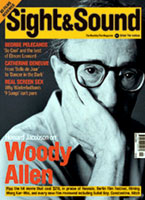
The girl can't help it
Film of the Month: 9 Songs

Michael Winterbottom's 9 Songs delivers sex and rock 'n' roll from the wastes of Antarctica. But does the earth move, asks Linda Ruth Williams.
Is 9 Songs British cinema's answer to Nine 1 / 2 Weeks ? A relationship is born, flourishes, then wanes over a period of a few months; its protagonists engage in a variety of experimental sex acts; these erotic set-pieces are punctuated by parallel sequences in the 'real world'. But instead of Mickey Rourke and Kim Basinger we have here Kieran O'Brien and newcomer Margo Stilley, and in place of a Hollywood unusually intent on shocking the malls we're in the territory of a strand of contemporary European cinema that's increasingly comfortable with sexually explicit content. Both films push the envelope of what was or is considered acceptable at the moment of their release, though Adrian Lyne's slick 1985 movie seems coy and tame set against the frank shenanigans of Michael Winterbottom's latest effort. 9 Songs is also the most recent tabloid target for the "UK's most explicit ever film" label, garnering notoriety since its airing at Cannes in 2004 and the BBFC's decision to pass it, uncut, for an 18 Certificate. The board may yet regret the decision - though often today's shock-flick all too quickly becomes yesterday's seen-_it-all-before bore. 9 Songs is certainly a cinematic oddity, a pop-punctuated romance with the pink shots left in.
There has long been speculation about whether the next step for mainstream cinematic sex will be the moment when a household-name star 'does it for real' for the cameras (augmented by rumours of established stars' pre-fame porno shoots). There are some precedents: the sex between porn icon Rocco Siffredi and actress Caroline Ducey in Catherine Breillat's Romance appears real enough, while Chloë Sevigny fellating Vincent Gallo in his ill-fated The Brown Bunny or Kerry Fox fellating Mark Rylance in Patrice Chéreau's Intimacy leave little room for doubt. The sporadic hardcore action in Despentes/Trinh Thi's Baise-moi may also have paved the way for what 9 Songs can get away with. And while O'Brien and Stilley are hardly household names, they do class themselves as actors rather than porn stars (O'Brien has appeared in such Brit-TV stalwarts as Coronation Street and Children's Ward, and is becoming a Winterbottom regular, soon to be seen in Tristram Shandy).
The shock value of 9 Songs lies in the sheer vérité of the spectacles laid out, scene by scene, as the relationship unfolds. If hardcore is defined through a checklist of acts, here we have nearly the full house of heterosexual hits: ejaculation shots, fellatio and cunnilingus, vaginal penetration (though, unusually, condoms are ever-present). And unlike in its predecessors, where the sex is momentary, here it takes up most of the screen time between the titular tunes. Whether it titillates is another matter - some may feel there's just too much, drowning the erotic tingle. Or perhaps the handheld artfulness ensures that any frisson is smothered by too-serious intentions. Some, like me, may simply find couple Matt and Lisa too annoying to get caught up in their heat.
One problem is 9 Songs' approach to its heroine. There may be equal-opportunities nudity here (erections as well as labia), but there's still something stereotypical about the way Lisa's pleasure is conveyed, whether she's pictured dancing for her man or tossing back her head in exquisite ecstasy. To make matters worse, these tired mechanisms for framing female abandon are accompanied by a voiceover that celebrates her wild-child qualities ("She was 21 - beautiful, egotistical, careless, and crazy"). We may see more of Lisa than of her European female predecessors - from Maria Schneider in Last Tango in Paris and Béatrice Dalle in Betty Blue to Emmanuelle Seigner in Bitter Moon - but this only heightens a sense of essentially sexualised girl-womanhood: even her irritating capriciousness reinforces an impression of girl-can't-help-it eroticism. And her disillusion with Matt is signalled by an increased interest in her vibrator - as if female sexual autonomy, as for Freud and a whole patriarchal history before him, is a bad sign (evoking the worrying possibility that second-wave feminism had no effect).
Admittedly, since the whole film is drawn from Matt's memories, this is woman as remembered by a man, and as directed by another man, though it would be churlish to blame it all on the male gaze, especially as Winterbottom's profile doesn't lend itself to such gender pigeonholing. A prolific maverick, he has produced films whose sheer diversity may be the only preparation for the unexpectedness of 9 Songs: from the austere misery of Jude through the perfectly pitched period piece 24 Hour Party People to the ponderous sci-fi of Code 46, Winterbottom can at least be relied on never to do the same thing twice.
9 Songs' curious mix of live concert footage and explicit sex makes sense in the context of its flashback structure: sex and songs shape our memories. As Matt looks back at the liaison from the icy wastes of his new job in Antarctica, his ponderous voiceover draws parallels between his frozen present and the warmth of his past ("Claustrophobia and agoraphobia in the same place," he says, snow-bound, "like two people in a bed"). His observation that the Antarctic is "a place where no man had been until the 20th century" seems to position Lisa as a denizen of Freud's dark continent of female sexuality. But 9 Songs is also an attempt to reflect on the way memories are imprintedon our bodies, ensuring we cannot easily let go of our sexual past, however painful. Matt says it is Lisa's smell and taste he remembers, and these lipstick traces don't rub off cleanly.
Cerebral as these reflections might be, 9 Songs will almost certainly be received as yards of 'smut' wrapped up in an elaborate arthouse box. In which case it's a shame the central device of having the concert footage comment on the stages of the relationship is so laboured. In themselves the '9 songs' of the title - musical moments from gigs the couple attend - are fine sequences of pop footage, featuring the cream of the contemporary UK music scene: Super Furry Animals, Elbow, Franz Ferdinand. But their elucidation of the romance is simplistic at best: Primal Scream's anthemic 'Movin' on up' does service for the relationship in ascendance ("You made a believer out of me") while Black Rebel Motorcycle Club's 'Love Burns' illustrates Matt's feelings about Lisa's departure ("Never thought I'd see her go away... Now she's gone love burns"). This is emotional semaphore: the songs tell the tale of love waxing and waning through a simple set of coded signals while the sex plays out as a pantomime of bodies unburdened by psychic complexity. And ne'er the twain shall meet.
